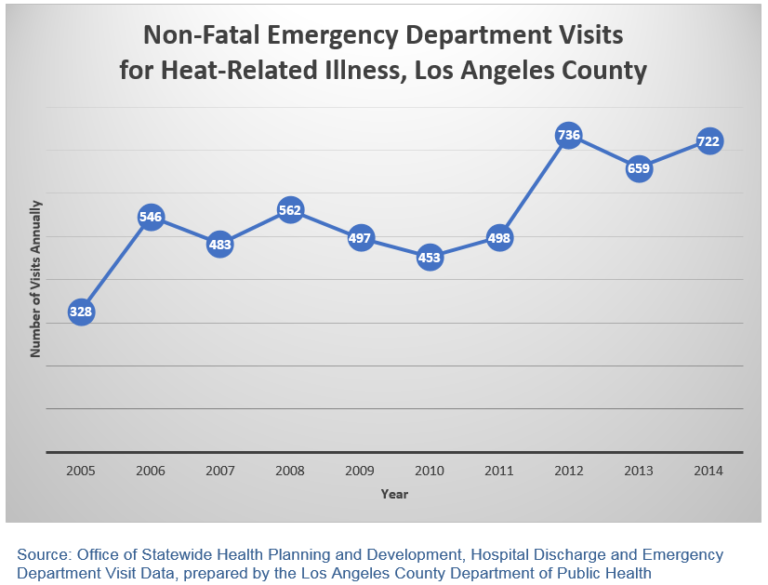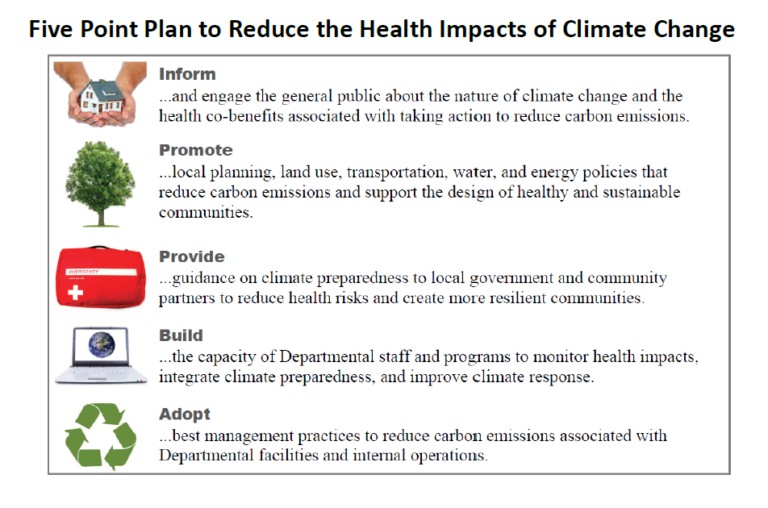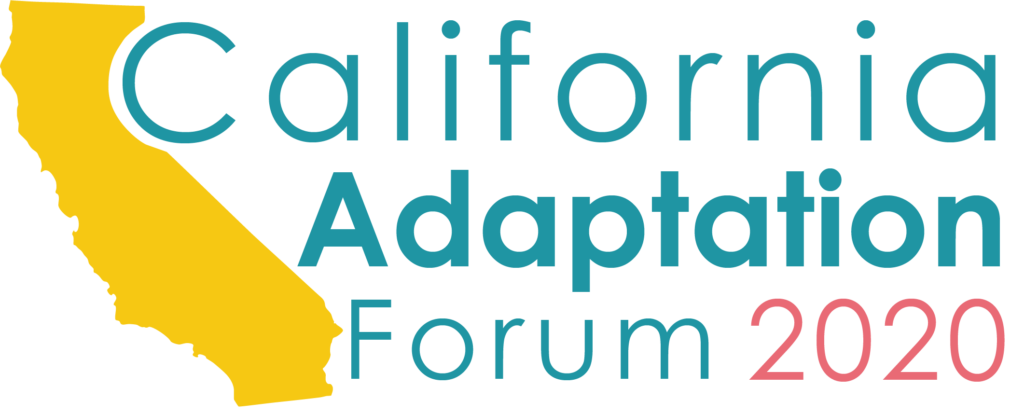Climate change has been called “the biggest global health threat of the 21st century.” It creates public health emergencies, worsens existing environmental conditions that contribute to poor health, and widens existing health disparities. These impacts are felt not just in distant locales, but also here in California. While all of us will feel these impacts, it is our already-burdened populations that will be the most affected.
Health impacts of climate change in Southern California
The impacts of climate change in Southern California include
- Hotter temperatures (increases in both average annual temperatures and the number of extreme heat days)
- Declining air quality;
- More acres burned by wildfires;
- Flooding and water quality issues; and
- More vector-borne disease.
Extreme heat is an increasingly visible example of the far-reaching health impacts of climate change. Heat waves are of real public health concern because the health impacts of heat result not just from direct heat-related illness (dehydration, heat exhaustion, heat cramps, and heat stroke), but also from the fact that heat stresses the body and exacerbates certain medical conditions, such as diabetes. Many people who are vulnerable to extreme heat—the elderly, people with existing medical conditions, and others—don’t realize this fact. Heat also contributes to other climate impacts: By accelerating the creation of ground-level ozone, heat worsens air quality. Along with drought, heat creates ideal conditions for wildfires.
Past heat waves have caused hundreds of deaths in U.S. cities. In California, a 10-day heat wave in 2006 led to more than 650 deaths, 16,166 excess emergency department visits, 1,182 excess hospitalizations, and more than $133 million in health-related costs. More recently, Los Angeles County has noted a worrying increase in heat-related emergency department visits:

The case for local health departments
Local health departments have an important role in protecting people from climate impacts such as extreme heat. For instance, the Los Angeles County Department of Public Health is responsible for declaring a heat advisory, alert, or emergency; convening other departments to organize the opening of cooling centers; and distributing public information. However, despite these natural linkages with climate mitigation and adaptation, local health departments have historically been largely absent from climate change decision-making. This is now changing, as it is increasingly recognized that local health departments can and must be important partners in mitigating and adapting to climate change, for the following reasons:
- Local health departments are on the ground in our communities, intervening in health emergencies and engaging communities about health disparities every day. It is essential that local health departments work to understand the local health impacts of climate change and act with urgency to protect the public from them.
- Research shows that talking about climate change in the context of health is the most effective way to elicit support for climate change policies and programs. Concern over health is universal and personal. For many years, climate messaging often focused on melting ice caps and polar bears; while these are sad, they’re not issues that are personal or immediate to most people. Health is both.
- Actions that mitigate climate change also have positive health benefits. For instance, promoting walking and cycling reduces greenhouse gas emissions, and also promotes health through increasing physical activity and improving local air quality. The Lancet Commission on Health and Climate Change calls these types of strategies “no-regret options,” as they are things we should be implementing—regardless of climate change—to create healthier, more resilient, more equitable communities.
Building capacity
At the Los Angeles County Department of Public Health, our mission is to protect health, prevent disease, and promote health and well-being. We are one of the largest health departments in the U.S., serving the public health needs of the country’s most populous county. With more than 10 million residents in unincorporated areas and 88 cities, Los Angeles County’s demographic and geographic diversity presents many public health challenges and opportunities related to climate change mitigation and adaptation.
In 2014, the Los Angeles County Department of Public Health adopted its Five Point Plan to Reduce the Health Impacts of Climate Change, which is the guiding framework for our climate work. It focuses on informing and educating the public, promoting policies and programs that reduce greenhouse gas emissions, providing guidance on climate adaptation, building internal capacity, and adopting best management practices to reduce greenhouse gas emissions associated with our own facilities and operations.

The Five Point Plan emphasizes using existing resources and integrating efforts into existing program activities, public education, and policy work. It also underscores the importance of engagement with other local agencies and stakeholders. The advantages of this approach are that new strategies can be embedded into existing pathways of health protection and education, the entire workforce can be leveraged to address climate change, and existing initiatives can be enhanced and better coordinated to maximize co-benefits in both health and climate change.
Since the adoption of the Five Point Plan, the Los Angeles County Department of Public Health has undertaken various activities to build workforce capacity and forge collaborations with external partners. We released a report on the local health impacts of climate change, partnered with UCLA to deliver a 16-session workshop series on those impacts and potential solutions, and collaborated with other County departments and local agencies to implement cross-sectoral solutions. For instance, the department convened a committee with the County Departments of Public Works, Regional Planning, Parks and Recreation, Internal Services, Fire, and Beaches & Harbors to develop an Urban Heat Island Reduction Plan. This new Plan will outline four strategies—cool roofs, green space, trees, and cool and permeable pavements—to help reduce the urban heat island effect and offset some of the warming expected with climate change.
Local health departments are trusted and are the front lines of our communities. For this reason, we are well situated to play a leading role in implementing climate solutions that improve resilience and promote health. However, in many cases, local health departments are not adequately staffed and resourced to do so. This needs to change, as there is much that still needs to be done to protect the public from the health impacts of climate change. We need to:
- Track data on climate-related indicators, both related to the environment and disease incidence;
- Expand our capacity for modeling and forecasting health impacts, and planning for those impacts;
- Gain a better understanding of the resources people need to cope with climate impacts such as extreme heat, and implement strategies that assist people in doing that;
- Expand and improve our ability to identify and reach vulnerable populations with messaging, and conduct meaningful community engagement on climate change;
- Train physicians and other healthcare professionals on best practices for how to teach their patients how to protect themselves from health impacts;
- Improve preparedness and response plans for climate impacts;
- Implement on a larger scale built environment solutions that promote climate mitigation and adaptation; and
- Promote workforce development so that staff are climate literate and trained to address the health impacts of climate change.
Climate change presents myriad threats and challenges. But it also presents opportunities: Opportunities to transform communities through changes to the built environment. Opportunities to increase meaningful community engagement. Opportunities to improve our overall preparedness and response. Opportunities to implement these “no-regret” options that create healthier, more resilient, more equitable communities.
 |
Elizabeth Rhoades, Ph.D., is the Director of the Climate Change and Sustainability Program at the Los Angeles County Department of Public Health, where she works to bring a public health voice to decision-making related to climate change. She works across sectors to provide subject matter expertise on the health impacts of climate change, promote policies that reduce greenhouse gas emissions, provide guidance on climate preparedness to local government and community partners, and build workforce capacity to address climate change. She founded and leads the interdepartmental County Climate Committee, which brings together Los Angeles County departments to implement the County’s Community Climate Action Plan. She has authored two climate change reports released by the Department of Public Health, entitled Your Health and Climate Change, and Framework for Addressing Climate Change. Elizabeth received her doctorate in public health from the Johns Hopkins Bloomberg School of Public Health. |

